
The New York Times published a powerful op-ed yesterday by Nasser Al-Aulaqi about the killing of his grandson Abdulrahman, in which he asked, “The government has killed a 16-year-old American boy. Shouldn’t it at least have to explain why?” In a federal court in Washington today, we are arguing that the government must explain and account for its actions.
Without accountability, what’s to stop the government from doing whatever it wants? This is why the Fifth Amendment requires that the state cannot deprive citizens of their “life, liberty, or property, without due process of law.” Yet when American drone strikes killed three U.S. citizens in Yemen in 2011 that’s exactly what it did.
The ACLU and the Center for Constitutional Rights have filed a lawsuit challenging the constitutionality of the U.S. government’s killing of Anwar Al-Aulaqi, Samir Khan, and two weeks later Abdulrahman Al-Aulaqi. The Justice Department has asked the court to dismiss the case, arguing that “political questions” and national security issues bar judicial review. But in fact, the courts have a crucial role to play in judging the legality of the government’s actions.
The lawsuit was filed on behalf of Nasser Al-Aulaqi, the father and grandfather of Anwar and Abdulrahman Al-Aulaqi, and Khan’s mother, Sarah. As the ACLU’s Hina Shamsi, one of attorneys who will appear today, said:
The Constitution does not allow government officials to kill Americans based on vague and shifting legal criteria and evidence never presented to a court. The government has argued that the court should step aside when the executive branch conducts extrajudicial killings of American citizens abroad, but the Supreme Court has ruled that the judiciary has an essential role to play in protecting civil liberties even in the context of actual military conflict. The Constitution’s protections are never more crucial than when the government seeks to deprive people of their lives.
In 2010, following press reports that the U.S. government had put Anwar Al-Aulaqi on a “kill list,” the ACLU and CCR filed a previous lawsuit representing his father challenging the government’s authority to do so. The court dismissed that suit on the grounds that the elder Al-Aulaqi did not have legal standing to challenge the targeting of his son, and that the request for before-the-fact judicial review raised non-justiciable “political questions.” The current lawsuit raises different legal questions because it was filed after the killings happened.
And so today, the question of whether the case should be heard on its merits is before a court. As CCR’s Pardiss Kebriaei, who will also argue in court today, said:
The government’s position is unprecedented and extraordinary. It claims the most consequential power a government can exercise against its own citizens – the power to take life without due process – and asserts that the courts should have no role at all in reviewing its actions, even after the fact, even when the killings are off any battlefield. The court should exercise its constitutionally mandated role and review our clients’ fundamental claims. It is for the court to determine the legality of the government’s actions, not for the government simply to assert it.
Today in a Los Angeles Times op-ed, former federal judge John J. Gibbons echoed that sentiment. He represented Guantánamo Bay detainees in the landmark 2004 Supreme Court case Rasul vs. Bush.
I argued that the president's position presented a profound threat to the role of the courts in safeguarding the rule of law, and that the prisoners were entitled to due process, including judicial examination of the government's reasons for holding them. The Supreme Court agreed, reaffirming that an asserted "state of war is not a blank check" for the executive branch when civil liberties are at stake.
Just as the Supreme Court ruled that judicial review was required in that case, it is essential in the targeted killing case being argued today – especially since it is about life and death.


%3Ciframe%20allowfullscreen%3D%22%22%20frameborder%3D%220%22%20height%3D%22280%22%20src%3D%22%2F%2Fwww.youtube.com%2Fembed%2FGQlbnulmnEw%3Fautoplay%3D1%26version%3D3%22%20width%3D%22500%22%3E%3C%2Fiframe%3E
Privacy statement. This embed will serve content from youtube.com.
Learn more about targeted killings and other civil liberty issues: Sign up for breaking news alerts, follow us on Twitter, and like us on Facebook.



